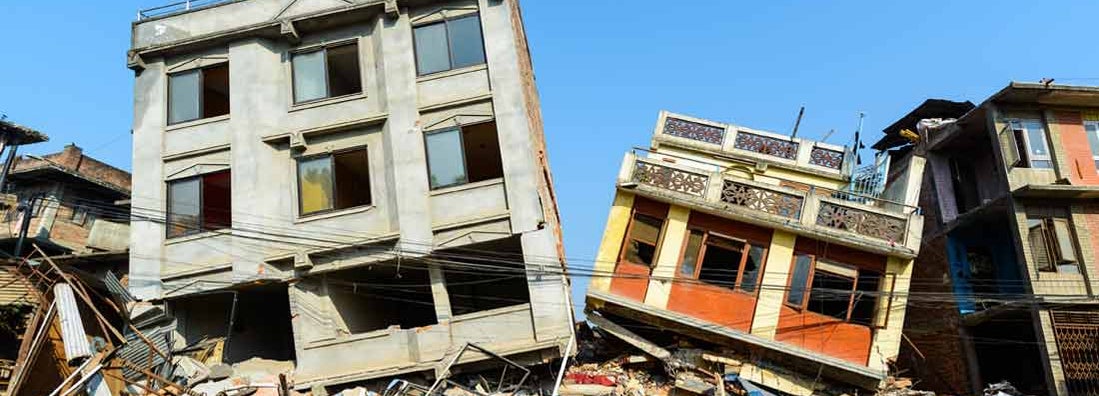Hawaii Earthquake Insurance
Find the right earthquake insurance policy for you.

Though better known for its risk of volcanic eruptions, Hawaii is also prone to earthquakes. While this state experiences about eight quakes a year, most are minor and nondestructive. Occasionally, however, a high magnitude quake does occur. In 1868, for example, a 7.9 magnitude quake caused millions in damages and killed 77 people. Nobody knows when the next big one will hit, so it is wise to be prepared by covering your property with a suitable earthquake insurance policy. The first step is to start collecting and comparing earthquake insurance quotes in Hawaii.
Use our independent agent matching system to find the best insurance plan in your area. You tell us what you’re looking for, and our search engine will recommend the best agents for you. Any information you provide will be sent to only the agents you pick. We do not sell to third parties.
Historic Hawaiian Earthquakes
- February 19, 1834: a quake of unmeasured magnitude shook the Hawaiian Islands, causing minor property damage. No volcanic activity was noted at the time.
- December 12, 1838: a quake similar to the one that occurred in 1834 was felt by residents. Again, no volcanic activity was noted.
- March 28, 1868: lava broke through the Mokuaweoweo, the summit crater on the southwest flank Mauna Loa. More than 300 strong shocks were felt at Kau and Kona. tT Kilauea, the ground quivered for days, sometimes vigorously.
- April 2, 1868: as a result of the previous volcanic eruption, a quake with an estimated magnitude of 7.9 was felt throughout the islands. Destruction was widespread and more than 180 houses were washed away by a resultant tsunami.
- January 22, 1938: a quake with a magnitude of 6.75 struck Mauna Loa. The quake caused damage to several buildings.
- August 21, 1951: a quake with a magnitude of 6.9 occurred on the Kona coast on the western side of Hawaii. Buildings, roads and utility systems were damaged or destroyed.
How Do I Get Earthquake Insurance?
Despite the fact that Hawaii is considered a high-risk state for earthquake damage, fewer than 12 percent of home and business owners carry earthquake insurance. This extra insurance coverage is almost never included as part of a standard home or business insurance policy and often must be purchased separately.
Earthquake insurance, which typically has a very high deductible, is designed to protect you if you suffer major losses because of a quake, but it may not be helpful if an earthquake causes only minor damages to your property, such as broken plates or small cracks in a wall. To purchase earthquake coverage, it is best to research companies that provide this coverage to Hawaiians and then request quotes and policy details from at least three of them.
Why Are Residents of Hawaii at Risk?
The Hawaiian Islands were formed by a large plume of hot magma that rose through the molten mantle between the earth’s crust and core. As it broke through the ocean’s crust, it created volcanoes, which formed the islands. According to earthquake seismologist Cecily Wolfe, “All [of Hawaii’s] earthquakes are ultimately associated with the processes that form the volcanoes.”
The many volcanoes situated on the ocean floor in the vicinity of the Hawaiian islands causes the ocean crust to flex, which can cause an earthquake. More damaging are the quakes caused by the expansion of these volcanoes as lava is pushed up from beneath the ocean.
Property belonging to residents of the islands is at risk for earthquake damage as well as the tsunamis and floods that often accompany quakes. Earthquake insurance, however, covers only damages to buildings and their contents that are the result of the ground shaking. Getting extra coverage in your policy to cover floods and tsunamis may be necessary.
Is Earthquake Insurance Expensive in Hawaii?
Hawaii has a higher than average earthquake risk and this is reflected in the earthquake insurance quotes you are likely to receive. Rates for residential coverage are based on:
- Where your home is located: Some parts of the islands have a higher risk of earthquake damage than others.
- The year your house was built: Houses constructed after 1970 are generally better able to withstand the tremors of an earthquake.
- The materials used to build your home: Wood is very flexible and better able to withstand quakes and tremors than brick.
- The value of your house and contents: As with any insurance policy, the more coverage you need to buy, the higher your rates will be.
The only way to discover how much an earthquake insurance policy will cost you, specifically, is to request quotes from insurance companies that provide this coverage in Hawaii. Keep in mind that without the extra liability insurance provided by this coverage, if your home is destroyed by an earthquake, you will have no way to receive compensation for your losses.
Where Can I Learn More about Earthquake Insurance in HI?
Finding and comparing earthquake insurance quotes for your Hawaii home or business is easy when you enlist the help of an independent agent in the TrustedChoice.com network. A local agent will be familiar with your earthquake risks and can offer you advice about your various policy options. These agents can also provide you with a variety of competitively-priced policies from which to choose.
Talk with an independent agent near your home or business to get more information and you can start comparing earthquake insurance quotes in Hawaii in no time.
